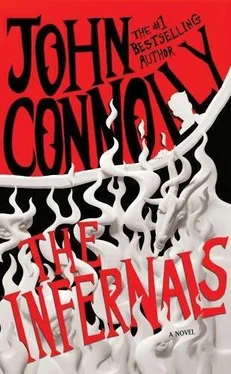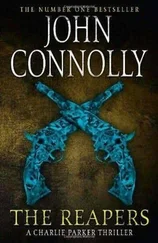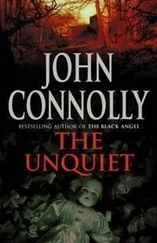John Connolly - The Infernals aka Hell's Bells
Здесь есть возможность читать онлайн «John Connolly - The Infernals aka Hell's Bells» весь текст электронной книги совершенно бесплатно (целиком полную версию без сокращений). В некоторых случаях можно слушать аудио, скачать через торрент в формате fb2 и присутствует краткое содержание. Жанр: Триллер, на английском языке. Описание произведения, (предисловие) а так же отзывы посетителей доступны на портале библиотеки ЛибКат.
- Название:The Infernals aka Hell's Bells
- Автор:
- Жанр:
- Год:неизвестен
- ISBN:нет данных
- Рейтинг книги:5 / 5. Голосов: 1
-
Избранное:Добавить в избранное
- Отзывы:
-
Ваша оценка:
- 100
- 1
- 2
- 3
- 4
- 5
The Infernals aka Hell's Bells: краткое содержание, описание и аннотация
Предлагаем к чтению аннотацию, описание, краткое содержание или предисловие (зависит от того, что написал сам автор книги «The Infernals aka Hell's Bells»). Если вы не нашли необходимую информацию о книге — напишите в комментариях, мы постараемся отыскать её.
The Infernals aka Hell's Bells — читать онлайн бесплатно полную книгу (весь текст) целиком
Ниже представлен текст книги, разбитый по страницам. Система сохранения места последней прочитанной страницы, позволяет с удобством читать онлайн бесплатно книгу «The Infernals aka Hell's Bells», без необходимости каждый раз заново искать на чём Вы остановились. Поставьте закладку, и сможете в любой момент перейти на страницу, на которой закончили чтение.
Интервал:
Закладка:
“Yes?” said A. Bodkin. “What is it?”
“Just wondering what all those blokes are doing.”
A. Bodkin lowered his newspaper.
“Blokes? Blokes? They’re not ‘blokes’: they’re highly trained demonic operatives, not just some imps-come-lately with lunch boxes and an attitude. Blokes. Tch!”
A. Bodkin returned to his newspaper, muttering about unions, and toilet breaks, and demons being lucky to have a job.
“Yes, but what are they doing?” repeated Dozy.
A. Bodkin rustled his newspaper in an I’m-very-busy-and-don’t-want-to-be-disturbed way, then, realizing that the short annoying person by his desk was not about to go away, lowered the paper again resignedly and said:
“Well, it’s obvious, isn’t it? They’re grinding the bones of the dead.”
“Grinding?” said Dozy.
“Yes.”
“Bones?”
“Yes, yes.”
“Dead?”
“Yes. They’re hardly going to grind the bones of the living, are they? That would just be messy.”
“Right,” said Dozy. He put his hands in his pockets and kicked idly at the sand, then remembered that it was not sand after all and apologized to it. “It’s nice to have a trade, I suppose.”
He sucked at his lower lip and thought for a moment.
“Where is this, exactly?” he asked.
“Oh, you’re not lost, are you?” said A. Bodkin. “Not another one. I mean, how hard can it be to get this right? You’re bad, you die, you come to Hell, you get processed, we find you a job somewhere. You’d think, after all this time, the chaps in Head Office would have this down to a fine art. Tch! I mean, really. Well, you’ll just have to make your own way to Central Processing. I’m far too busy supervising to help you.”
He raised his left arm and examined an hourglass on his wrist to indicate just how busy he was. Sands poured from the upper glass into the lower one, but the level of the sands in the upper glass didn’t get any lower, and the level in the lower glass didn’t get any higher.
“Just one small thing,” said Dozy. “Tell you the truth, two small things. Smallish. Actually, not small. Bit big, to be honest.”
He laughed nervously.
“Go on, then,” said A. Bodkin. “But this had better be the end of it. You’re distracting me from my work. Production has already decreased in the time that we’ve been talking. If I don’t keep an eye on this lot, I’ll have protests, people asking for tea breaks and time off to visit their aunties or go to the dentist. Look at them: they’re already on the verge of revolt!”
Dozy looked at the lot in question. They looked about as likely to revolt as A. Bodkin was to mind a baby without stealing its pram.
“That business about being dead,” said Dozy. “What did you mean by that, exactly?”
“Oops, sorry,” said A. Bodkin, who didn’t look sorry at all. “You mean, you didn’t know. Tragic, just tragic.” He stifled a giggle. “Well, frankly, you’re dead. No longer alive. Faithfully departed. If there’s a bucket nearby, then you’ve kicked it. If you were a parrot, you’d have dropped off your perch. And the second thing?”
“Huh?” said Dozy, who was still trying to come to terms with the first thing, which he hadn’t liked the sound of at all. “Oh, you mentioned something about Hell.”
“Yes?”
“That would be-why?”
“Because that’s where you are: Hell.”
“The Hell?”
“Are you aware of any other?”
“No, but I didn’t think Hell was real.”
“Now you know better. Happy?”
“No, can’t say that I am. I don’t feel dead.”
He pinched himself. It hurt.
A. Bodkin looked at him in a curious manner.
“You know, you don’t appear dead either,” said A. Bodkin. “Most dead people tend to look slightly dead: you know, pale, missing a limb or two, bullet holes, blood, bleh.” A. Bodkin let his forked tongue loll from his mouth and made the whites of his eyes show in a reasonable impression of someone whose best days are behind him and no longer has to worry about brushing his teeth in the mornings. “But you don’t look like that at all.”
Dozy was already backing away. “Nice talking to you,” he said. “Good luck with all of the bone stuff. Be seeing you again. Byee-ee!”
He trotted back down the dune. He looked over his shoulder just once, to see A. Bodkin tugging at his beard in a thoughtful way that boded ill for someone.
Dozy started running.
XI
SAMUEL FELT BOSWELL LICKING his face. He tried to brush the dog away, but Boswell seemed insistent that he wake up. Samuel didn’t want to. His limbs ached, and his head hurt. He wondered if he might not be coming down with something.
Then he remembered: disappearing vans; a blue light; Mrs. Abernathy’s face in a puddle…
Mrs. Abernathy.
He opened his eyes.
He was lying on his side by the bank of a dark, muddy river that flowed viscously in the direction of a copse of crooked trees. Beneath his cheek was hard ground topped with sparse, blackened grass. He raised himself to his knees, and Boswell yipped with relief. Samuel gathered his dog into his arms and stroked him, all the while looking around and trying to get some sense of where he was. He had a memory of falling, and being aware that he was falling, but when he tried to stop himself he just fell faster. There had been a moment of compression and severe pain, and then nothing.
Above him were black clouds broken by veins of burning red. It was like looking into the heart of a volcano, and he experienced a sensation of dizziness as, briefly, up became down, and down became up, and he had a vision of himself kneeling at the bottom of a great sphere suspended in a furnace. He had to fight the urge to fall back and hold on to the ground. Instead he hugged Boswell tighter and said, “It’s okay, it’s all okay,” but he was trying to convince himself as much as the animal.
Mrs. Abernathy had done this, he knew, which meant that they could only be in one place: Hell. Somehow she had wrenched them from their world into hers, and that could only be for one purpose: she wanted revenge. Already, she would be looking for them.
Although he was now just thirteen, and no longer considered himself a child, Samuel wanted to cry. He wanted his mother; he wanted his friends. Back in Biddlecombe, when he had faced Mrs. Abernathy’s wrath, he had done so surrounded by familiar buildings, and with the support of those whom he loved, and who loved him in return. Here he was alone, except for Boswell, and it says much about the kind of boy Samuel was that, even in the midst of his own fear and sorrrow, he wished he had remembered to let go of Boswell’s leash before he was transported. His loyal dog had no business being here, and yet Samuel was also not a little grateful that Boswell had in fact come with him, for there was at least one other being who was on his side in this terrible place.
No, that wasn’t entirely true. Boswell was not the only one who cared about him. There was another. The question was: how could Samuel find him?
Wormwood tapped Nurd on the shoulder.
“Master, why have we stopped?”
The car, still disguised as a rock, had been making good progress across the Vale of Fruitless Journeys, as Nurd put as much distance as possible between themselves and the cave in which they had been hiding. The Vale was formed of massive slabs of brown stone on which the car left no tracks. To the west (or maybe it was to the south, such concepts as direction having little or no meaning in a place where reality struggled to maintain a grip on itself) they ended at the Forest of Broken Forms, where those who had been vain about their looks, and dismissive of those whom they didn’t consider as pretty as themselves, were condemned to spend their lives as ugly trees. But that way was too close to the Mountain of Despair for Nurd’s liking, and so they had proceeded in another direction, or what they hoped was another direction given that Hell had a habit of confounding such expectations, so that you might head off away from Point A with the best of intentions only to find yourself rapidly back at Point A without ever having veered from a straight line. Ultimately, they wanted to reach the Honeycomb Hills, where they could hide themselves before the Watcher or, worse, its mistress, came hunting for them.
Читать дальшеИнтервал:
Закладка:
Похожие книги на «The Infernals aka Hell's Bells»
Представляем Вашему вниманию похожие книги на «The Infernals aka Hell's Bells» списком для выбора. Мы отобрали схожую по названию и смыслу литературу в надежде предоставить читателям больше вариантов отыскать новые, интересные, ещё непрочитанные произведения.
Обсуждение, отзывы о книге «The Infernals aka Hell's Bells» и просто собственные мнения читателей. Оставьте ваши комментарии, напишите, что Вы думаете о произведении, его смысле или главных героях. Укажите что конкретно понравилось, а что нет, и почему Вы так считаете.












